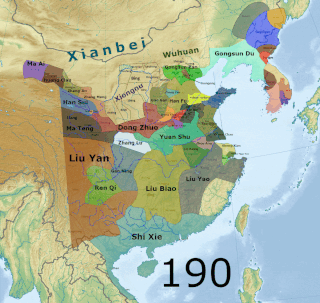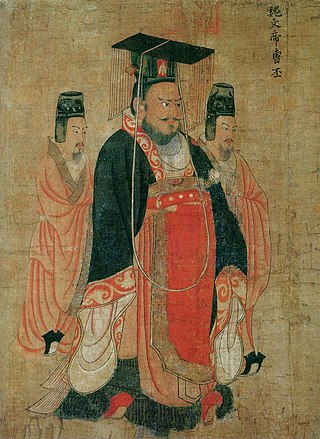The 200s decade ran from January 1, 200, to December 31, 209.
The 210s decade ran from January 1, 210, to December 31, 219.
The 220s decade ran from January 1, 220, to December 31, 229.
The 230s decade ran from January 1, 230, to December 31, 239.

The Three Kingdoms of Cao Wei, Shu Han, and Eastern Wu dominated China from 220 to 280 AD following the end of the Han dynasty. This period was preceded by the Eastern Han dynasty and followed by the Western Jin dynasty. Academically, the periodisation begins with the establishment of Cao Wei in 220 and ends with the conquest of Wu by Jin in 280. The period immediately preceding the Three Kingdoms, from 184 to 220, was marked by chaotic infighting among warlords across China as Han authority collapsed. The period from 220 to 263 was marked by a comparatively stable arrangement between Cao Wei, Shu Han, and Eastern Wu. This stability broke down with the conquest of Shu by Wei in 263, followed by the usurpation of Cao Wei by Jin in 266 and ultimately the conquest of Wu by Jin in 280.

Year 208 (CCVIII) was a leap year starting on Friday of the Julian calendar. At the time, it was known as the Year of the Consulship of Aurelius and Geta. The denomination 208 for this year has been used since the early medieval period, when the Anno Domini calendar era became the prevalent method in Europe for naming years.

Year 221 (CCXXI) was a common year starting on Monday of the Julian calendar. At the time, it was known as the Year of the Consulship of Gratus and Vitellius. The denomination 221 for this year has been used since the early medieval period, when the Anno Domini calendar era became the prevalent method in Europe for naming years.

Romance of the Three Kingdoms is a 14th-century historical novel attributed to Luo Guanzhong. It is set in the turbulent years towards the end of the Han dynasty and the Three Kingdoms period in Chinese history, starting in 184 AD and ending with the reunification of the land in 280 by the Western Jin. The novel is based primarily on the Records of the Three Kingdoms, written by Chen Shou in the 3rd century.

Xiahou Dun, courtesy name Yuanrang, was a Chinese military general and politician serving under the warlord Cao Cao during the late Eastern Han dynasty of China. He served for a few months under Cao Cao's successor, Cao Pi, before his death. As one of Cao Cao's most trusted generals, Xiahou Dun aided the warlord in his campaigns against Lü Bu, Liu Bei, Sun Quan and others.

Cao Pi, courtesy name Zihuan, was the first emperor of the state of Cao Wei in the Three Kingdoms period of China. He was the second son of Cao Cao, a warlord who lived in the late Eastern Han dynasty, but the eldest son among all the children born to Cao Cao by his concubine, Lady Bian. According to some historical records, he was often in the presence of court officials in order to gain their support. He was mostly in charge of defence at the start of his career. After the defeat of Cao Cao's rival Yuan Shao at the Battle of Guandu, he took Yuan Xi's wife, Lady Zhen, as a concubine, but in 221 Lady Zhen died and Guo Nüwang became empress.

Han (漢; 221–263), known in historiography as Shu Han (蜀漢 ) or Ji Han (季漢 "Junior Han"), or often shortened to Shu (Chinese: 蜀; pinyin: Shǔ; Sichuanese Pinyin: Su2 < Middle Chinese: *źjowk < Eastern Han Chinese: *dźok), was a dynastic state of China and one of the three major states that competed for supremacy over China in the Three Kingdoms period. The state was based in the area around present-day Hanzhong, Sichuan, Chongqing, Yunnan, Guizhou, and north Guangxi, an area historically referred to as "Shu" based on the name of the past ancient kingdom of Shu, which also occupied this approximate geographical area. Its core territory also coincided with Liu Bang's Kingdom of Han, the precursor of the Han dynasty.

Huang Zhong, courtesy name Hansheng, was a Chinese military general serving under the warlord Liu Bei during the late Eastern Han dynasty of China. He is best known for his victory at the Battle of Mount Dingjun in 219, in which his force routed that of an enemy general, Xiahou Yuan, who was killed in action during the raid.

Guan Ping was a military general serving under the warlord Liu Bei during the late Eastern Han dynasty of China.
Mi Fang, courtesy name Zifang, was a Chinese military general and politician serving under the warlord Liu Bei in the late Eastern Han dynasty. He was also the younger brother of Mi Zhu, who also served Liu Bei. In 219, Mi Fang surrendered to Liu Bei's ally-turned rival Sun Quan, directly resulting in the loss of Jing Province and the death of Guan Yu. The Australian Sinologist Rafe de Crespigny notes that Mi Fang had the remarkable record of serving each of the leaders of the Three Kingdoms during his lifetime.
Wen Ping, courtesy name Zhongye, was a military general who lived during the late Eastern Han dynasty and Three Kingdoms period of China. During his tenure as a general under the warlord Cao Cao, he was credited with defeating the enemy general Guan Yu and defending Cao Cao's interests in Jiangxia Commandery from the eastern warlord Sun Quan.

The end of the Han dynasty was the period of Chinese history from 189 to 220 CE, roughly coinciding with the tumultuous reign of the Han dynasty's last ruler, Emperor Xian. It was followed by the Three Kingdoms era. During the end of the Han dynasty, the country was thrown into turmoil by the Yellow Turban Rebellion (184–205). Meanwhile, the Han Empire's institutions were destroyed by the warlord Dong Zhuo and fractured into regional regimes ruled by various warlords, some of whom were nobles and officials of the Han imperial court. The warlord Cao Cao took control of Emperor Xian and his court in 196 and began gradually reunifying the empire. Cao Cao ostensibly operated under Emperor Xian's rule, though in reality the emperor was a hostage.
Dong Zhao, courtesy name Gongren, was an official of the state of Cao Wei during the Three Kingdoms period of China. He previously served under the warlords Yuan Shao, Zhang Yang and Cao Cao consecutively during the late Eastern Han dynasty.
Yi Ji, courtesy name Jibo, was a Chinese diplomat and politician serving in the state of Shu Han during the Three Kingdoms period of China. He previously served under the warlord Liu Biao in the late Eastern Han dynasty before coming to serve Liu Bei, the founding emperor of Shu Han. Yi Ji was known as an excellent debater and helped write the Shu Ke (蜀科), the legal code of Shu, along with Zhuge Liang, Fa Zheng, Li Yan and Liu Ba.
Wang Zhong was a military general of the state of Cao Wei during the Three Kingdoms period of China. He previously served under the warlord Cao Cao in the late Eastern Han dynasty.
Jingzhou or Jing Province was one of the Nine Provinces of ancient China referenced in early Chinese texts such as the Tribute of Yu, Erya, and Rites of Zhou.










